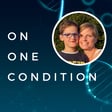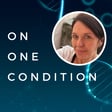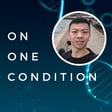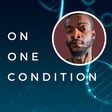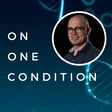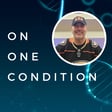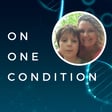Become a Creator today!Start creating today - Share your story with the world!
Start for free
00:00:00
00:00:01

Episode 49: Kerri Mauer - Myasthenia Gravis
Kerri lives with Myasthenia Gravis (MG), a rare autoimmune condition that has turned her life upside down. Through profound reflections, she shares the multifaceted impact of MG on her life, touching on themes of resilience, loss, and gratitude. Kerri describes the strength required to live with an “invisible disability” and the journey to reframe her life around moments of beauty and simplicity. This discussion with Kerri feels like a journey in itself, filled with wisdom and warmth.
The song that Kerri chose is Both Sides Now by Joni Mitchell.
Transcript
Introduction to 'On One Condition' Podcast
00:00:00
Speaker
Hi, I'm Sylvain Bertolo, and you're listening to On One Condition, a podcast to raise awareness about health conditions by listening to people who live them every day.
Kerry Maurer on Living with Myasthenia Gravis
00:00:12
Speaker
My guest today is Kerry Maurer, and we're going to talk about Myasthenia Gravis. Hi, Kerry. Thank you for joining me on the podcast. How are you doing? Good morning on my end. I'm doing great. I'm happy to be here.
00:00:29
Speaker
So I love starting with a song. And what would you like to tell us which song you've you chose and why you chose that song? Absolutely. um And I'm just going to tell you right now, i'm I'm definitely going to get emotional a little bit about it, which I think is a good thing. um Joni Mitchell ah wrote a song called Both Sides Now. And unbelievably, she was only in her 20s, but she had already had a tough life and was a new mother. And I i think from what I read, she her her child was put up into foster care and she had troubles with the the child's father. She's traveling on a plane and she's reading a book and Saul Bellow, the author, is talking about clouds. This song this song um is created as she's looking down at the clouds. And it it is so moving for me as it is, I think,
00:01:27
Speaker
for people all over the world and in such huge numbers because Mitchell talks about um seeing life from both sides now, seeing the clouds from up and down, seeing love, seeing love from give and take. And I think the song has always spoken to me. it's It's absolutely beautiful.
Emotional Journey: Diagnosis and Mental Health
00:01:49
Speaker
That said, once I was given this diagnosis and my life was turned upside down,
00:01:56
Speaker
as somebody who's always been very joyful and really just lots of positive energy all the time, it it has been it has been the case that I've had to monitor and address sometimes mental health, my own mental health um but the the health with the symptoms. And her song is just so beautifully captures what it is to experience the joy and the hardships and the challenges in life. Yeah. Wow. So much into a song. yeah oh Oh, yes. That one is very powerful. and So straight away, I'm going to hit you with a hard question then. Yeah. So is it what it feels like
00:02:47
Speaker
Like if you look at your life before myasthenia gravis and your life now, does it feel like two different sides of life? Yes. And um I yeah recently, and I'm very glad I did it, I went off of my antidepressant medicine, which um I've taken for 20 years, taken separate from having this diagnosis.
00:03:14
Speaker
I've just always been an anxious anxious person. um And i I've only done that six weeks ago, and I'm noticing that I'm more in tune with my emotions. I feel like I'm reconnecting with myself in a beautiful way. And part of that is um experiencing more ah the ups and downs of what it is to live with myasthenia. So absolutely, um before I had this disease,
00:03:44
Speaker
I you know was was um you know nicknamed Sunshine in in in in my schools where I taught, and I still look for the sunshine every day, and um but it's but it's more difficult to do. That is for sure. It is not easy. I i don't want to be the depressing guest, but you know when all of a sudden you can't walk and or in a bad flare, you can't use your thumbs anymore.
00:04:15
Speaker
um and you're dropping things. um you know And those are just a few examples. Yes, that's it I've seen life now from both sides. And I'm, of course, as a result, so much more grateful for every moment. Yeah, yeah, I bet.
Early Symptoms and Misdiagnosis Challenges
00:04:31
Speaker
So, well, you've already mentioned a couple of symptoms. So what were the first signs of myasthenia for you? So interestingly enough,
00:04:44
Speaker
um my My journey to diagnosis, of course, has been along when you're asking about my earlier symptoms. I'm sure this is the case with many of your guests. Only in really looking back after the diagnosis do I go back as far as almost 30 years ago and 40 years ago into childhood and realize that I had some of these issues starting then. and so Some of the very early examples would be when I was a child,
00:05:14
Speaker
um and and Again, not enough to to worry about. I didn't drink from a glass normally. and My mom kind of my mom and dad but you know would look at me and say, what's going on? Here's how we drink from a glass. and It was a lack of muscle control around my mouth. um I would drool a little more on my pillow sometimes as a child. and then I would try to keep up with friends if we were trying to go jogging and my my lungs, my breathing, I would have to stop very quickly because I couldn't do that. So that was growing up. And then those those symptoms kind of went by the wayside for quite a while. And then in my twenties, when I became an educator, a high school teacher, which I loved, I noticed that not all the time, but occasionally,
00:06:07
Speaker
just projecting my voice to teach in class, I was losing my voice pretty quickly. And this is a voice right now that is for me raspy because I am waiting for my next step, infusion. And so it is compromised, so to speak. um So those are some of my first symptoms much earlier in life. In in the last 10 years, when I really started the process of looking for a diagnosis,
00:06:36
Speaker
the bigger symptoms that that got the attention of doctors um were that I couldn't hold things. You know, my arms wouldn't always um work. um My hands wouldn't always work. In a few doctor appointments, eight or nine, 10 years ago, I guess, I would get off of the exam table and fall and just fall.
00:07:05
Speaker
because my legs, because my legs, you know, out of the blue, out of the blue. um So skeletal muscles. And 10 years ago, it was mostly the arm and leg muscles that were affected. Yeah. So you mentioned going through diagnosis. Did you receive a diagnosis from MG straight away or not?
00:07:31
Speaker
No. I was just reading about getting a diagnosis from MG. I was on a Yale yale medical website. and Interestingly enough, they said, oh, some people, you know it takes a while to get a diagnosis up to a few years. Oh my goodness. If it had only been a few years, 10 years ago, ten years I started having symptoms that that were coming in in flares and in groups that were concerning.
00:08:01
Speaker
And because like also I have um lupus ah as an additional autoimmune disease runs in my family. My grandmother had it. My mother and mother lives very well with it but has it. We were doing blood tests. And because I also had you know other symptoms that are not MG related that we were trying to sort out, including hives and rashes and things of that that nature. And so I was first diagnosed with Lyme disease, Lyme's disease. And I was living in Maryland and Lyme's disease was fairly prevalent. So I had some markers show up on a blood test and I said, maybe that's what that is. Maybe you're fatigued and whatever. Maybe that's what it is. So I went down the road of, I'm going to learn about that. And then as time passed within maybe another year and a half,
00:08:59
Speaker
It just didn't match up my symptoms and the simple diagnosis of just Lyme's disease. So I worked with rheumatologists and they couldn't find the answers. It was an undiagnosable autoimmune connective tissue disease is what they called it. I then, because I wanted answers, I'm i'm one of those people that's going to keep learning and looking for for the right diagnosis, got to Hopkins and at Hopkins,
00:09:28
Speaker
I sent them all my photos because again, it wasn't just muscular stuff. We weren't even focused on that as much. There was also rash and and other things on my skin. I sent photos and my whole file and within three minutes of meeting the doctor at Hopkins, she said, it's good to meet you. You you have lupus. So I left feeling relieved that I had a diagnosis but also still concerned because some of what I was describing to her symptom-wise didn't fit with the diagnosis. That said, she put me on the the treatment regimen for lupus and it's pretty harsh. It's it's a pretty harsh regimen and I couldn't tolerate it. I couldn't tolerate several of it. of the drugs with like 20 some side effects impacting my my ability to yeah function whatsoever. And so when I saw her, I don't know, maybe a year after my first visit and I was nervous, I was raised to respect doctors 100% and listen and and follow up their advice. I told her I had this list of symptoms. I researched that the drugs were causing most of them.
00:10:48
Speaker
and that on top of my actual symptoms, I needed to not take this drug. And our comment was, then you should find another doctor. um So I had a diagnosis, wasn't sure if it was correct, was having additional mysterious symptoms. And my final diagnosis came a good 10 years after the start real downfall um and didn't happen until I fell for the final time in class as a teacher and came home and told my husband, I can't do this anymore. i I'm very worried about my inability to speak, my inability to project my voice, my difficulty breathing, my that I'm dropping everything, that I'm falling downstairs, that I have vertigo on the stairs at school. I'm losing control of even my bladder sometimes.
00:11:41
Speaker
I need to make this my top priority to get answers. And not only am I not going back one more day in the classroom, as much as I loved it, I would like to move to the other coast. I'm from the West Coast, from California. And I wanted to get closer to family and nature. I think because I was trying to handle what was some fear about living with a mystery illness. And so coming out here, I pretty much kind of given up after seeing Hopkins and Georgetown specialists and neurologists on the East Coast, that if they couldn't figure it out, I probably wasn't going to get answers. but But out here, I met an amazing doctor within months and within a year of seeing this neurologist, he diagnosed me with a number of neurological issues.
00:12:32
Speaker
found a great rheumatologist who said, it's not lupus. We think you have Srogren's disease as well, which that's another story, but it can trigger my myosinia from time to time. And I didn't test, interestingly enough, um positive with the blood marker for the antibodies of myosinia. Really? Okay. No. Yeah. So um luckily with this disease, unlike so many autoimmune diseases,
00:13:02
Speaker
I was still given, I still had the opportunity to have neuromuscular testing done. And so I had repetitive nerve testing done and he was, the doctor was able to clinically diagnose that I had myasthenic nervous. So 10 years.
00:13:21
Speaker
10 years journey to to get to the right diagnosis with treatment that sounds very harsh on the way. Yeah. Absolutely. Yes. and and And then that started, and that was two and a half years ago, and that started the treatment options now for the actual disease of mice. Okay. Yeah.
00:13:45
Speaker
Welcome back to to the the treatment. ah But I think before we we go into that, I think it'd be interesting too for you to share if you know what the d disease exactly does, um because everything you've mentioned seems to be related to muscles. So does it impact your muscle strength? And if so, how do you know?
Understanding Myasthenia Gravis Impact
00:14:12
Speaker
Yeah. So myosinium gravis is an autoimmune disease that damages the neuromuscular junction. And that is the junction which allows the nerves to communicate with the muscles. And as a layperson, for me and as an English teacher, this this kind of analogy worked for me. your If you have a new lamp,
00:14:35
Speaker
and you want to plug your new lamp in and you want it to work, you know that you have you have correct wiring in your wall that's ready to go at the outlet and you have a lamp that's functioning. So you plug that lamp in and turn it on and it should work. Well, my nerves work perfectly. All the testing shows my muscles work great. What is being damaged by this autoimmune disease is the junction or the outlet that allows them to communicate. So my symptoms, I have them all the time, but the severity of them waxes and wanes based on how my how my disease is what stage my disease is in, where it's at. So sometimes um I can use my thumb to
00:15:33
Speaker
to pick things up and my legs can walk okay. And then other days and for sometimes months at a time often, I can't move get my legs to move well. Okay. So does that mean that you can't walk at all then? Sometimes yes, sometimes yes. And when I say, and I should take that back, I can walk usually because of medications, infusions,
00:16:01
Speaker
diet changes and lots of resting. But walking for me is another world now. Sometimes that means that yeah I look out my window um a lot because I can't get out as easily much of the time. And I sometimes, it's a big deal if I could walk across the street to the neighbor's house. That would be a big outing just to walk there for two minutes and to walk back.
00:16:27
Speaker
um With myasthenia, one thing that helps is after some muscle use, um your muscles start to fail within minutes usually. And what you have to do is give in to that and allow them to rest. And then they often come back a little bit after you rest.
00:16:47
Speaker
So that means that, to correct me if if I misunderstood, but you could walk for five minutes or even less. And if you don't rest, you risk falling. Is that right? Yes. And that's absolutely right. And the same for using my arms. And it's also the case that let's say early in the day, I the things that I think you think about when you have MG, you just look at life differently, but not just life, just your everyday tasks. If I want to lift something that's a little bit heavy, now, not heavy to you, but heavy to me. So in my new world, I
00:17:30
Speaker
I'm having a backstory discussion in my my brain, okay, if I lift that, I might be able to do it for a second. But the cost is going to be that I've overtaxed my muscles and made me for a day or two or more, they aren't going to perform for me. And my arms are going to be slippery, so I have to think carefully before I do things. And and that's for heavy things. for you know When I wasn't being treated before I started infusions, I couldn't lift ah my teacup. Even a week ago, waiting for my next infusion, two hands and my arms kind of have to work together to lift a glass sometimes. yeah and Occasionally, I can't sit up. I can't hold my head very well. I can't hold my spine.
00:18:22
Speaker
So when we talk about hidden disabilities or hidden chronic illnesses, you wouldn't be able to tell when I look at you. It doesn't it doesn't show. No, which makes me all the more guilty, I suppose, when I use my newly um given handicap placard. you know i I put that up and and i i'm I'm literally internally kind of anxious thinking, who's going to come up and confront me and say you save this for people who need it? Yeah, yeah, yeah. I'm not surprised. So does it impact your energy? Or or do you have do you still have a lot of energy, but you can't translate that into the movements you want to make? That's a good question. Actually,
00:19:17
Speaker
I would say sometimes i I still have some of my old energy, but mostly I don't. i i Again, that whole looking at tasks and functioning in life, I look at it all so differently. I don't have much energy. And I don't, because everything is so exhausting. So, okay, if I'm going to answer the door because someone is ringing the doorbell,
00:19:41
Speaker
oh How tired am I gonna be afterward every task that I think about starting? It's Okay All right. I got this. Yeah, so and and again coming from a family that just prides themselves um On hard work and long hours as as I did as a teacher, you know working till midnight every night working all weekend all the time grading, um you know college level essays I I can't keep up at that pace. I'm on and that's hard. That's hard. Yeah. I imagine that it has an impact on your mental health if you're used to being able to do so much. Well, I mean for anyone. For anyone, absolutely. And and I'm not here, I'm not looking for any pity and and i've I've processed this quite a bit. But i think I think what has been hard when I've connected with people with MG and there's a wide world of them even though it's a rare disease that you can find on Facebook,
00:20:41
Speaker
But the um the majority of the ones in the Pacific Northwest who who show up anyway for monthly support groups online, which are which are love wonderful, many of them are so much older than me. And I feel as though, and some people ah You know are diagnosed with this as kids um And and life has taken and changed You know when they're in their early teens 20s and it hit me I feel like in my prime so in my 40s and so I It's been especially challenged because the challenge because I feel like I've been simultaneously dealing with the mg dealing with the mental health challenges of mg and maybe the third and
00:21:28
Speaker
lane, which isn't a big one, but the third issue is midlife and um you know that I'm aging more quickly, I'm feeling. As somebody who wants to live healthy and did eat well and does eat well,
00:21:43
Speaker
um it's like having someone kind of sit you down and you know in your head, I need to eat well, I need to exercise, but you're but you can't do one of those two things. You can't do that exercise. So my exercise is literally I can take my plate to the sink. I can hold a book for a little bit. I can get up and down from a chair. That movement is something that I can celebrate. Okay. From talking to people with other conditions that impact their energy, they also talk about brain fog and the fact that it's impacted not only their muscles, but also their brain. Do you have
00:22:28
Speaker
um something some some symptoms like that as well? I do. And I just recently did a little bit of my own research. And again, I'm not a medical doctor, but I did focus in my teaching career on media literacy. So I definitely get my information from medical and reliable sources. But there there have been some studies done with MG that there are actual ah cognitive dysfunction.
00:22:58
Speaker
exists, and I have definitely seen it. um Some studies have found that patients with MG actually perform worse than controls on cognitive tests. And for me, this is something I didn't know about the disease. When you read about it, it's you know you know arms and legs and maybe a droopy eyelid, which all of that is happens to me and is serious. But the cognitive function, I learned about it because a few years ago, I started literally running into my own walls in my home. So for me, way more than brain fog, way more than not being able to access a memory or remember a name or feeling foggy. I'm running into walls and visiting urgent care with a goose egg that has left a dent in my skull and I don't know why it happens. And it's because sometimes there there isn't my brain is either taxed
00:23:57
Speaker
or stressed and um verbal and visual learning, processing speed, reaction time, memory comprehension, visual reasoning, quantitation, all of those things for me have been impacted at times. And did you realize that or not really? and Can you expect it that it's going to happen or not?
00:24:25
Speaker
um I can't predict when that's going to happen. I know that when I'm not feeling well ah physically and my my eyelid is halfway open and my eyes are blurry and my arms and legs don't work, that I need to be more mindful and really slow down because and not drive, but surely not walk quickly and even my home because I might run into something. I want to be clear that this part of the diagnosis or the symptoms um is not the the larger
00:24:56
Speaker
more common piece of the diagnosis. It's more skeletal muscles being damaged. But for me, it's been, to be honest, the more scary part of the diagnosis. you know I can sit on the couch and have lots of my body not work, but when I can't even access my brain occasionally to the caliber that I was used to doing as somebody who's still in the prime of my life, that is hard sometimes.
00:25:24
Speaker
Yeah, I can imagine that. It's scary, yeah. It comes and goes. ah So far, it comes and goes. It doesn't feel like it's a straight progression downward, cognitively, which is good. Okay.
00:25:39
Speaker
So you mentioned treatment earlier.
Medication and Treatment Trials
00:25:42
Speaker
ah What kind of treatment do you receive? It sounds like it it's something that's regular and that you're looking forward to because it goes up and down and rather down before your treatment. Yeah. So when I was first, we were first with my neuro neurologist here in the central Oregon, Ben Dredmond area, working with him for a diagnosis.
00:26:07
Speaker
before we did testing for myasthenia, he um gave me prescribed me mastemon. It was my response to that medication, to that mastemon, which you take every three hours and it can help um the nerves temporarily, because you're taking it every three hours, connect with the muscles. So my improvement um was an indicator for him that we should go down the myasthenia diagnosis.
00:26:36
Speaker
um and then And then because of that improvement, limited improvement, and the nerve testing results, I then started with Drexel infusions. And i I get those every six months. What I have found, the loading dose is larger. And so when I first got it, I felt so well, I got really excited. Then they back off of that loading dose and you take ah you know you get a smaller amount.
00:27:06
Speaker
every six months, the rest of your life. What I found in two years is that I i told my doctor, it was kind of like a roller coaster. As far as the visual trajectory, two months it would take to load in your system. And then I would get it, and then I would get a good maybe six weeks. And then the last two and a half months, I would be coming down from, from, from an improvement and toward the end and the final good eight weeks, which is where I'm at right now.
00:27:37
Speaker
pretty severe symptoms return. And so in addition to that, I've tried a few other things, we then started trying to supplement that with IVIG. It's expensive and insurance covered it, of course, but very expensive. And many people, unlike my infusions, my body struggled with accepting it, accepting it, it it rejected it.
00:28:05
Speaker
and I had some benefits from it, so I said, no, I'm going to handle it. And the the allergic response would last maybe three or four days, or no, for me, maybe 12 days, but I would get a few really good days out of it. Pretty soon, after doing that for maybe six months, I had an IVIG infusion, and the response was so severe. It was 32 days of full-body welts and hives.
00:28:35
Speaker
So it was, okay, we need to take that off the table. the like and My body is saying that that one's not working. And then interestingly enough, my insurance company actually said my case was complex enough because of the sugarg griin ah possible Sjurgren's diagnosis. I don't test positive for that as well, but my rheumatologist says that I have that. That if I wanted to have my immunoglobulin Infusions more regularly. They wanted me to get a ah second opinion. They wanted me to be seen by Oregon Health and Sciences University. um And so I just was there in August and um he he confirmed that you know most likely, yes, you have myasthenia. The testing shows that. But because the blood testing doesn't show that, I am not eligible for the newest treatment
00:29:33
Speaker
which I think would be really beneficial if my body you know can handle it. I'm pretty allergic to a lot of things. I can tell when I saw my neurologist and he saw the results from the OHSU top neuromuscular specialist that he was frustrated. he he He used the word frustration and said, I wish we and wish we could get um a positive blood test for this disease because you would then be eligible for something that is newer,
00:30:03
Speaker
has the ability to possibly help you more. At this point, we are going to continue with testing to see if I don't eventually test positive for MG in the blood. And if I don't, my only other option would be plasmapheresis. Wow, okay. it's It's interesting hearing you say, oh, there is this new treatment.
00:30:32
Speaker
the which could be good if my body accepts it. And I think a lot of people just don't get that treatment is good. It's on the market, it's been tested, but it doesn't mean that it's good for everyone. It doesn't mean that everyone is going to respond to it and some people may completely reject it and it could be worse actually.
00:30:59
Speaker
Absolutely. so and I found that with IVIG. I imagine it's even trickier when it's a rare disease because the the population is so small compared to other treatments that there may not be more than one variant of the treatment. so yeah ands jack It is. The reading that I've just done recently about this drug, I'm not eligible for at this point.
00:31:28
Speaker
which as you can imagine is frustrating because there there is another test other than the blood test that allows a qualified doctor to diagnose me and I pass that test, so to speak. i I had the nerve testing. We know that I have this. There's no doubt. But when I researched that drug um and all the drugs that are available for myosinia,
00:31:55
Speaker
I think the number was 60% to 70% of people are helped by some some you know group of these drugs, using some of these drugs, 60% to 70% and do well and and many others still continue to struggle despite trying. So is there anything else that can help you apart from treatment?
Dietary Changes and Health Improvements
00:32:17
Speaker
Yeah. um i think so I'm a big one for staying positive as as much as I've talked about how this is all challenging. And and it's definitely, I've had a roller coaster of not not just emotion, but I mean dealing with depression. The big thing that I've learned maybe this past winter, I found UCLA trained board certified licensed doctor. Her name is Dr. Brooke Goldner. I found her on YouTube and
00:32:49
Speaker
When she was in her teens, I think she was diagnosed with lupus. I don't want to get her her facts, or her story incorrect, but pretty she had it pretty bad. She she had organ involvement. um She was told she might not live very long. She was told she would not be able to have children, but she fell in love. And the person she was going to marry said, you know, I love you and a short life with you is better than a life without you. And just in order to get in her best shape for her wedding honeymoon in Hawaii, her fiance who was a trainer offered when she asked to put her on a diet to get her in shape. So she goes on this very strict diet, gets in shape, has an amazing honeymoon, feels better than she's felt in a long time.
00:33:41
Speaker
and comes back and again she's a new doctor and realizes when she gets her blood work done for lupus that for the first time in a long time she's not testing positive for lupus she's not showing those markers that she has lupus so as as an amazing doctor and scientist she says okay I want to help people but before I you know get this out to to the public, I need to do some research. So I think she and her husband did a bunch of research and ah learned and understood how food impacts our body um in a way that she hadn't learned even in medical school, which is her big issue. And now mine, a huge one, um that that that those two things aren't connected, that we don't see food as a treatment. But what she has done,
00:34:36
Speaker
And her protocol has allowed her, keeping up with this strict diet that I'll go into, 19 years being free of lupus. She's run marathons. She's had children. She has a thriving practice helping people. ah The practice that I think is called good Goodbye Lupus, but she helps people with a variety of autoimmune diseases. And I just want to be clear.
00:34:59
Speaker
um She offers everything for free online. She says you don't need her services if you just would do the protocol, the food protocol and the protocol, which I did and has helped me, um is it's pretty strict. It is pretty strict. And she is very big about it's not a diet. This isn't a short term thing where this isn't about weight loss. This is about healing your body and actually allowing yourselves to heal.
00:35:29
Speaker
healing your body at the cellular level. And and here is here's what we do. It's a gallon of water a day. It's a pound of greens a day. Certain greens, but greens. I just get power greens. And you put them in a blender with no more than 20 ounces in an entire day of frozen fruit just to blend it up and have the smoothie be palatable.
00:35:55
Speaker
um And you add, the only other thing you have to add to that smoothie is flax seeds or chia seeds. um For me, for digestive reasons, it's it's much easier on the the stomach to have flax seed oil, which is expensive, but I do three tablespoons of flax seed oil. So I drink that throughout the day, so it's easy on the stomach, and I drink my gallon of water. and And she says in addition, and really nothing else,
00:36:25
Speaker
you can eat unlimited green vegetables, but but the key is it all has to be raw. And she's had people that she's healed, everyone that's worked with her who who who chooses to do her four and six week classes, completely heal. Autoimmune diseases, sometimes issues with diabetes, cardiac issues, heal, okay? Disease is not showing any, I know heal isn't a word,
00:36:52
Speaker
or cure that we want to use, but no symptoms moving forward and healthy. People who have worked with her, who are vegetarians, have gone back to eating one day of cooked food, one day of just cooked vegetables, and disease progresses all over again. So there's something about the raw vegetables. And then the only thing that has to be added into the diet um On top of that plan is three quarters of a teaspoon of iodized, the key being iodized, salt a day because we can't get iodine um in the in that protocol otherwise. Yes. yeah So you don't eat anything else apart from what you've mentioned? No. And when I did that, when I took that on, what do I else you know what do i have to lose? I had already been eating very healthy. you know
00:37:42
Speaker
Salmon and lots of water every day and no alcohol and all of those things and no processed food But when I did that I went from unable to walk ah More than in my house to Being able to go this by week two on this diet Walk with my husband in nature briefly and he would bring a chair and I would sit every so many feet to recover That was week two by week four. I I was able to hike four and a half miles in one month's time. The challenge for me, and and I think the hard part is, MG is not just triggered by food. So what happened over time, and I still eat that diet, I started adding in, all right, I noticed that I was still having symptoms and flares because of stress, because of
00:38:41
Speaker
emotional emotional triggers be because of sunlight for me. I'm photosensitive and that can be a trigger for my Sjogrens and then that can trigger my MG. So where am I going with that? A little bit harder to stay on that limited diet and not occasionally when you're on steroids and just ravenous, not just add in a cup of oatmeal or quarter a quarter cup of oatmeal or something else. And so I occasionally do that. I do add that in and try not to be hard on myself about it because I'm very hungry, but also because steroids are hard on your stomach and sometimes greens aren't the easiest. So I eat that diet, but I realize that it is not can't solve everything.
00:39:28
Speaker
permanently for me because I can't get rid 100% of all stress. I can't get rid of sunlight even though I can limit my exposure. yeah So multiple triggers. Well, it's still incredible that its through diet. I'll look it up because it's very interesting. and Absolutely. i I just saw that last month the Journal of American Medical Association released a new consensus statement about the need for more medical education for med students. And they actually finally have proposed nutrition competencies for medical students and physician trainees. And that's exciting.
00:40:06
Speaker
yeah yeah Yeah, that's good because there's so many conditions that can be positively impacted by diet. diet I mean, what you shared is incredible, ah but you also shared about your case, diet doesn't solve everything. right But it's something that goes with medication or that goes with more exercise and so on. yeah Absolutely. I really see it as medicine. I really do. And I i think um for people with autoimmune disease and people who are very, very not well,
00:40:42
Speaker
if we can see it not as um if we can eat to live, not live to eat, and see it as an opportunity to help heal the body, even if it can't completely, we have a chance to feel better, even if we are going to return to a pre ah-disease state.
00:41:02
Speaker
Yeah.
Finding Joy Post-Diagnosis
00:41:04
Speaker
So I'd like to go back to something you started with, that song by Joni Mitchell, both sides now. You may not agree with this, but you mentioned that before MG and after the MG, there' both there's two different sides of life. Do you feel like with the injections and with the diet, you you're kind of finding another side that's somewhat a bit more positive?
00:41:32
Speaker
So I'm smiling because I love that question and it it encourages me to to reframe you know my life. And I want to be clear that it isn't as simple for me as pre-MG life was great and post-MG life is not great. Pre-MG life was simpler and easier. Post-MG life is more complicated, but it is often I still find in the rich complication of life.
00:42:02
Speaker
and living with challenges that I am able to, because I have no choice often but to slow down, to appreciate some of the more basic things in life that I am confident that if I never had this disease, I would never have been able to um appreciate and age at this age anyway, right? So there's, I think, with it comes some wisdom and comes some appreciation and gratitude just for being on this planet, not making assumptions about what we are owed in this life. I just recently wrote a chapter in a book that's going to be released about rare diseases. And my chapter actually is, um I talked to the editor and I said, I just, I can tell many stories, but
00:42:56
Speaker
I really feel like the one I need to tell is that I can't put a bow on this. This is not a hallmark card. I'm not gonna just tell you life is better because I've learned something and and I've made the best of it. No, my chapter is actually about reaching out as a non-religious person to a former Buddhist teacher that I did some training with. Again, I'm not religious, I'm not a Buddhist, but in practicing some of the basics,
00:43:26
Speaker
life, the tenets of Buddhism and applying them to my life as someone who's living with this disease. And what I've what i've taken away is much of my suffering is about expectations tied to what I'm assuming life is going to be. And if I can let go ah those expectations and just as as we know Buddhism is about as it is about many things but it is about living in this moment this moment right here with you and the sound of us talking and I'm watching the Sun come up over the over the east right now over the mountains from my window if I can be in the moment and I can remember that I really only have today and this moment and not make assumptions about what the future will be or or tie
00:44:21
Speaker
ah myself to any expectations about what it is, then I'm a better person, and I'm a happier person in my heart. And so that is what my story is about, figuring that out, and I feel like I have. I stray from it occasionally from that from that big lesson, but um on my darkest moments, but but I very quickly now know how to pull myself right back out of it and look into my puppy's eyes. I have three now. I never thought I'd have more than one, but that's been a big part of finding joy and you know and enjoy their wagging tails and um that the sun is coming up and the tea and how it feels in my in my hands, in my cup in the morning. So things that I don't think I would have slowed down to do otherwise. So enjoying the the small moments, the small things that's very inspiring.
00:45:15
Speaker
And that book you mentioned is Erin Paterson's book. Yes. Yes, positively rare. Erin was on on the podcast recently. Right. Yes. Yeah. Thank you for mentioning that book. Well, I feel like you've taken me on a journey. um I really feel like there was a clear beginning to to this um to this discussion and that we've reached an unnatural end that was beautifully said by you. I just have one last question that I love asking everyone. What's your happy place, the place where you feel at peace? So it's a two-part answer. My happy place before MG was in the classroom. And again, I get to this in the book. I'm not trying to promote it.
00:46:11
Speaker
um My whole identity was wrapped up in being an educator. from from you know Even though I was ah am a loving and caring mother and and wife um and friend, everything was about being an educator and being in that classroom. I came alive, the kids came alive, and it was magic. Since my diagnosis and having to leave the classroom and moving across the country, my happy place is a combination of two things.
00:46:40
Speaker
the Pacific Northwest is just so beautiful. And I'm so grateful I moved here, but for me, it's taking it up another notch and taking my dogs, my two very athletic laboratory treevers who are so healthy and my new mini dachshund who's so curious and taking all three of them with my patient husband who's willing to take all three of them and me into nature whenever I can join them on hikes along the the Deschutes River Trail. And when I can watch them smiling, I don't think before this something that I understood and could identify a dog smile. And I now see that in nature when they're running and retrieving in the rapids and smelling at the base of the pine trees. And that's my happy place.
00:47:33
Speaker
Nice. nice i want to I want to go there. Yes. Please come out. You're welcome to visit. Stay with me. Amazing. Well, thank you so much, Kerry. That was yeah very inspiring.
00:47:48
Speaker
and Obviously, we've learned a lot about Myasthenia gravis, but I really feel like we've shared the journey together, so thank you. I really enjoyed it. Thank you.
00:48:03
Speaker
and And I would say in closing, thank you so, so much because you're you what the work you're doing is so, it's so important to put a personal spin on these diseases and and especially the rare ones. It's it's critical. it's It's critical. I think it's also important for us to reach out to each other, those of us in the rare disease community to support each other.
00:48:29
Speaker
and and you're allowing us to learn from each other. And I've listened to many of your podcasts and they're the people's stories. I mean, they're very powerful. So thank you for the work that you do as well. Thank you. My pleasure.



